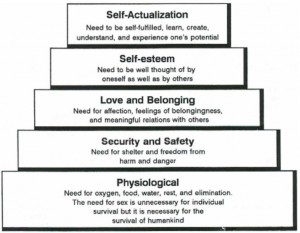Psychologist Abraham Maslow defined basic human needs as a hierarchy, a progression from simple physical needs to more complex emotional needs (see figure 1-2).
Types of Needs.
- Physiological–food, shelter, water, sleep, oxygen.
- Safety–security, stability, order, physical safety.
- Love and belonging–affection, identification, companionship.
- Esteem and recognition–self-esteem, self-respect, prestige, success, esteem of others.
- Self-actualization–self-fulfillment, achieving one’s own capabilities.
- Aesthetic–beauty, harmony, spiritual.
- Relationship Between Levels of Needs.
- According to Maslow, the basic physiological needs related to survival (food, water, etc.) must be met first of all.
These basic physiological needs have a greater priority over those higher on the pyramid. They must be met before the person can move on to higher level needs. In other words, a person who is starving will not be concentrating on building his self-esteem. A patient in severe pain will not be concerned with improving his interpersonal relationships.
Generally speaking, each lower level must be achieved before the next higher level(s) can be focused upon.

